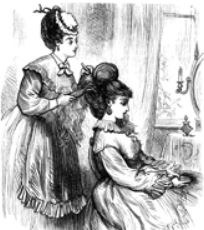Paris Downstairs : La soubrette
From "Victorian Paris" (http://victorianparis.wordpress.com/2014/01/04/paris-downstairs-la-soubrette/)
This excerpt from Octave Uzanne’s The Modern Parisienne was written in 1912, but it captures the attitude towards servants and women in general of the period that we are studying.
Of all the domestic employees in Paris, only a small percentage was the natives of the city. Parisians had always been naturally free-spirited and insubordinate. Employers  seeking servants knew this and preferred to hire applicants from the provinces. These proved to be more dependable, obedient and steady.
seeking servants knew this and preferred to hire applicants from the provinces. These proved to be more dependable, obedient and steady.
“Whether they come from Auvergne or Poitou, from La Vendée or Gascony, from Provence or even from Flanders, the servants of Paris scarcely ever lose the tone of their native places, the accent of their provinces, or the traces of their origin,” wrote Octave Uzanne in his book The Modern Parisienne (1912). Long working hours, little opportunity to socialize and the sense of being a miniscule clog in the crushing machinery of a metropolis forced the provincials to seek each other for moral support, to hang together, and to preserve their native culture. Of all the newcomers to Paris, servants were the least amenable to change their ways. Native Parisians, on the other hand—and pretty girls especially— sought to climb the social ladder.
The following excerpt from The Modern Parisienne , introduces us to la soubrette, the shrewd lady’s maid, so typical to Paris that no light comedy could do without one:
[A Parisian girl] will take a situation as maid, especially with the demi-monde, in the hope that through one of these ladies or her gentlemen friends she will make her fortune. She reflects that her mistress’s origin, probably Belleville or some other poor quarter, is no better than her own, and that she is certainly not any prettier or more charming. This hope is frequently realized, particularly if the maid is pretty and treats the guests with discretion. In any case, this kind of situation is only a stepping-stone, and very often the girl who begins her career as a maid in the chic quartiers may be seen subsequently figuring as a star at the Moulin Rouge, as a singer in a fifth-rate café or (the last resource of old age) the proprietress of some shady house at Batignolles or near the École Millitaire.
She has learnt from her mistress the great game of getting the most possible out of Monsieur, and she plays it with remarkable success – within the limits of the law. But in the first instance she is more of a soubrette than a maid-servant, the pretty smart girl who always has an answer for the Fantins and Scapins of the servants’ hall. She has the advantage over them of the natural duplicity of her sex, and the unassailable position of being in all her mistress’s secrets. She is her agent in trickery; she knows all her mysteries, her deceptions, her debts, her intrigues, her dressmaker’s bills. Nothing is hidden from her. She is on the watch, observes everything, and succeeds in accumulating sufficient materials to make her position absolutely secure. She is coquettish, scrupulously clean, scented, affects a superior accent, and seasons her conversation with a spice of racy slang. She is very sentimental, and loves, above all, the feuilletons in the papers. If she is not as successful as she hopes with her mistress, she tries her hand on some old bachelor, and becomes his confidential housekeeper.